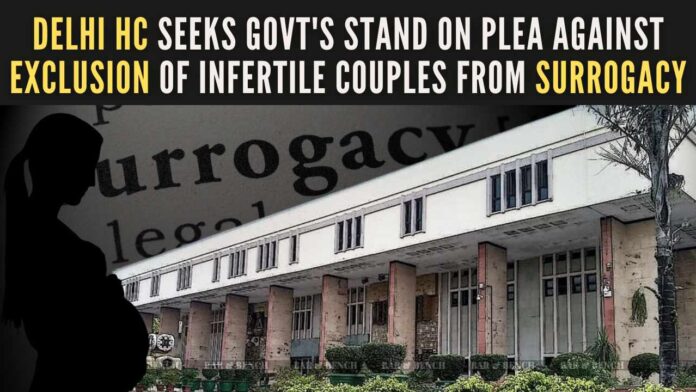
Delhi HC seeks Centre’s response on plea against notification barring the use of donor gametes in surrogacy
The Delhi High Court on Tuesday sought the Government of India’s stand on a petition challenging the exclusion of “infertile couples” from the benefit of surrogacy. A bench of Chief Justice Satish Chandra Sharma and Justice Subramonium Prasad issued notice to the Central government on the petition by a married couple aggrieved by the amendment to the surrogacy law “effectively barring the use of surrogacy services by infertile couples unless both of them have the ability to generate gametes”.
In their petition, the couple said before the March 14 notification by the Union government – which introduced the exclusion in question by amending Para 1(d) of Form 2 under Rule 7 of the Surrogacy (Regulation) Rules, 2022, they were looking for a surrogate as the wife was found to be infertile but have now been deprived of their right to parenthood for all times to come and their fertilized embryo has become “legally unviable”.
“Infertile couples are discriminated against only on the basis of whether they have the capacity for bearing gestational pregnancy. Where the wife has a viable or healthy uterus, such a couple is permitted the use of donor gametes whereas if the wife in another case does not have the capacity to carry gestational pregnancy the couple is denied surrogacy and parenthood rights,” the petition filed through lawyers Lalit Mohan Bhat and Saumya Tandon said.
“The notification bars ‘infertile couples’ access to legally regulated surrogacy services unless both of them generate gametes. Thus, if the husband or the wife is not able to produce sperm or egg (Oocyte), they are disentitled to avail the facilities under the Surrogacy Act,”, it stated. The petition said this “restrictive condition” violates the fundamental rights under Articles 14 and 21 of the Construction as well as deprives the petitioners of their basic civil and human right to parenthood and complete family life.
“Petitioners have a vested right to parenthood and the amendment cannot be allowed to render their legally fertilized embryo unviable,” the plea said. “The impugned notification seeks to restrict surrogacy services only for couples having the capacity to produce their own gametes as such violates their fundamental rights under Article 21 of the Indian Constitution. Genetic purity of the embryo and the foetus cannot be the basis of depriving an infertile couple of parenthood, if it was, adoption would be impermissible in law,” argued the petition.
The petition stated that a lawful surrogacy has been rendered unlawful by the amendment and the petitioners are at risk of criminal prosecution if they proceed with surrogacy at this stage.
PGurus is now on Telegram. Click here to join our channel and stay updated with all the latest news and views
For all the latest updates, download PGurus App.
- Subramanian Swamy approaches Supreme Court on Govt’s modification of 2G Scam Judgment to avoid auction of Satellite Spectrum - April 23, 2024
- Defence Minister Rajnath Singh visits Siachen. Reviews military preparedness - April 22, 2024
- Amit Shah’s shares in the Stock Market almost doubled in the past five years - April 21, 2024










